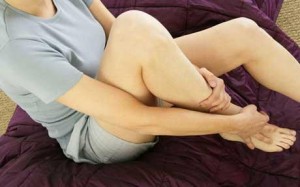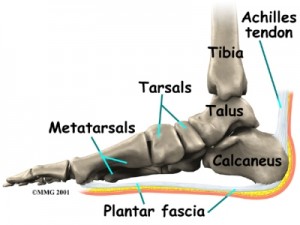Plantar Fasciitis
Posted on February 2nd, 2012 by Andries

What’s that pain?
When your first few steps out of bed in the morning cause severe pain in the heel of your foot, you may have plantar fasciitis. It is one of the most common foot problems.
Plantar fasciitis is inflammation due to repeated overstretching of the plantar fascia ligament, usually at the point where the fascia is attached to the heel bone. This condition can also occur at the front of the foot. Tension develops in the plantar fascia both during extension of the toes and during depression of the longitudinal arch as the result of weight bearing.

When a patient has plantar fasciitis, the plantar fascia becomes inflamed and worn out; these abnormalities in return can make normal activities quite painful. The pain typically worsens early in the morning after sleep. This pain is the result of the foot resting in plantar flexion (toes pointing forward) overnight. This allows the fascia to shorten. When you wake up in the morning the shortened or contracted fascia is stretched by simple movements and pain occurs and that is why you’re first few steps out of bed in the morning is painful. As you begin to loosen the plantar fascia, the pain usually decreases, but often returns with prolonged standing or walking
A Couple of signs or symptoms are pain in the anterior medial heel, usually at the attachment of the plantar fascia to the calcaneus (heel), as well as pain during the first few steps in the morning or after a long period of sitting.
The risk of developing plantar fasciitis are people who are active in sport, people that are flat-footed, middle-aged or older people, overweight individuals, incorrect footwear as well as pregnancy.
Some treatments used:
- Night splints. Use night splints to maintain a gentle, constant stretch across the plantar fascia.
- Heel pads. Felt, gel, or synthetic heel pads spread and absorb shock as the heel lands easing pressure on the plantar fascia.
- Decrease standing and stressful activities until heal pain is better.
- PRICE – pressure, rest, ice, compression and elevation would reduce inflammation.
- Stretch the heel cord and plantar fascia.
- Massage area of pain, especially in morning after a warm bath or shower.
For more details or questions on this topic, don’t hesitate to contact me on 0834686544 or send me an email
Tweet